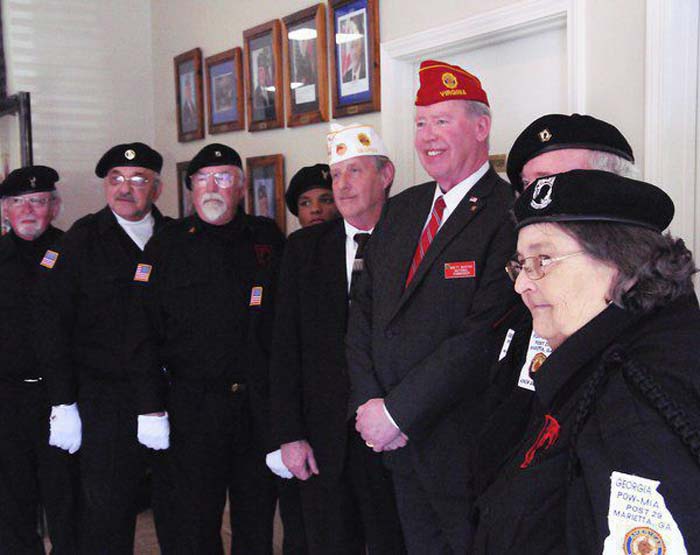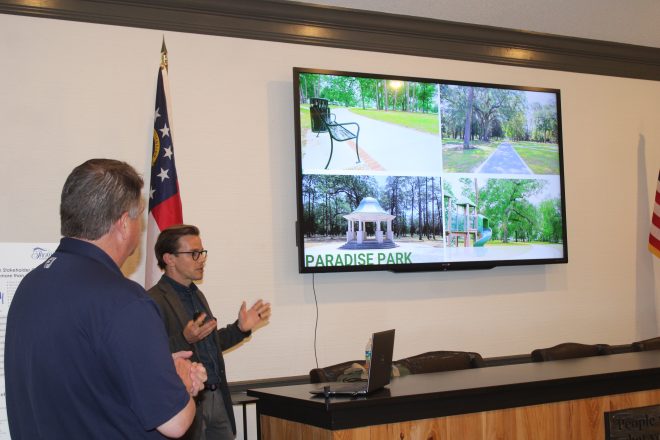‘Dalton supports our veterans’: City welcomes American Legion national commander
Published 7:00 am Tuesday, April 30, 2019

- Chris Whitfield/Daily Citizen-NewsAmerican Legion National Commander Brett P. Reistad, in the red hat, poses with members of the Georgia POW-MIA honor guard from the Marietta post before Monday night's dinner at Dalton American Legion Post 112. American Legion members from across the state came to greet Reistad.
DALTON, Ga. — Chartered by Congress in 1919, the American Legion now has more than two million U.S. military veterans as members in more than 13,000 posts across the world.
And on Monday night, Legion members and dignitaries from across Georgia flocked to Dalton American Legion Post 112 for a dinner honoring American Legion National Commander Brett P. Reistad.
“This is really a great honor for the post to host the national commander,” said post Commander Lee Oliver.
Reistad was greeted as he arrived by a large American flag displayed from a Dalton Fire Department ladder truck and an American Legion honor guard standing outside the door to the post.
Reistad said he was impressed by how he had been welcomed to Dalton.
“It’s not just the Legion family. It’s the larger community, and I don’t see that everywhere I go,” he said.
Members of the Whitfield County delegation to the state legislature — Rep. Kasey Carpenter, R-Dalton; Sen. Chuck Payne, R-Dalton; and Rep. Jason Ridley, R-Chatsworth — were among those in attendance.
“As a veteran myself, and a member of this post, it is an honor for me to be able to welcome the commander,” said Payne, who presented Reistad with a proclamation from Gov. Brian Kemp honoring him.
State Supreme Court Justice Charlie Bethel, a native of Dalton, was also on hand.
“I think the turnout tonight shows how much Dalton supports our veterans,” he said. “But it also shows the influence this post has. It’s very active in the community, and its leaders are very respected. So when they have an event like this the community wants to support them.”
Reistad spoke to those attending the dinner about the history of the American Legion and about its current status.
“The Legion is faring well,” he said. “But we are losing members as our World War II generation and Korean War generation and, increasingly, our Vietnam War generation are passing away. We are wrestling with how we can appeal to the younger generation. Some posts are faring with that issue better than others.”
Reistad said he tells post officials they have to reach out to younger veterans and to give younger members a say in how the posts are run.
“Younger veterans are often looking for a family experience, and we are a family-oriented organization,” he said. “In addition to the Legion itself, we have the Sons of the American Legion (for the sons of Legion members or those who qualify for Legion membership) and the American Legion Auxiliary (for the wives and other female relatives of Legion members or those who qualify for Legion membership).”
Reistad said the Legion operates youth programs such as Boys State and American Legion baseball. And he said it has the Legion Riders for motorcycle enthusiasts as well as amateur radio groups.
Reistad also spoke about some of the national initiatives the Legion is focusing on.
“We are looking at things like veterans suicide, what can we do, who can we partner with to help with that issue,” he said. “The VA (Veterans Administration) is reaching out to other service organizations. A large part of it is educational — how to spot someone who is potentially suicidal, how to intervene, how to direct people to help. One of the numbers the VA has publicized is that 14 of every 20 veteran suicides are not in contact with the VA. We are looking at how we can spot veterans who are in need of help and get them in contact with those who can help.”
He said the Legion is also supporting the Legion (Let Everyone Get Involved in Opportunities for National Service) Act, which was introduced in Congress earlier this year.
Currently, under its congressional charter, the American Legion can only admit as members those veterans who were honorably discharged and served during those periods officially recognized by the government as periods of war or conflict.
“Our research has found that about 1,600 service members were killed or wounded during periods that weren’t recognized as wars or conflicts,” Reistad said. “You don’t have to serve during a war to face danger.”
The Legion Act would open membership in the American Legion to all honorably discharged veterans since World War II.





